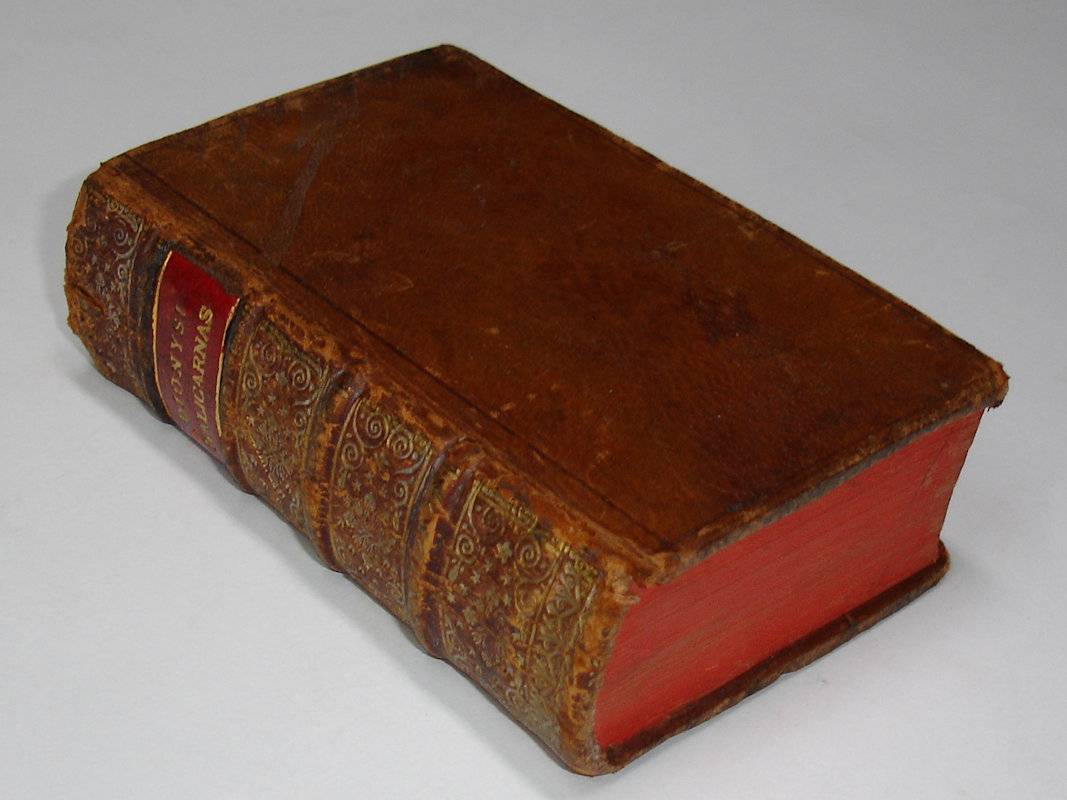DIONYSIUS HALICARNASSENSIS.
Dionysii Halicarnassei Antiquitatum, sive Originum Romanarum libri decem, Sigismundo Gelenio interprete. Adiecimus Undecimum ex versione Lapi: ac indicem rerum notatu dignarum locupletissimum.
Lyon (Lugduni), Apud Antonium Vincentium, 1561. (Colophon at the end: 'Lugduni excudebat Symphorianus Barbierus)
16mo. 854,66 p. Calf 12.5 cm (
Ref: Hoffmann 1,586; Graesse 2,400) (
Details: Back gilt, and with 4 raised bands, red morocco shield in the second compartment. Endpapers marbled. Edges of the bookblock dyed red. Latin translation only.) (
Condition: Binding somewhat scuffed, corners bumped.
Waterstain on the title. Paper slightly yellowing) (
Note: The 'Antiquitates Romanae' of the Greek rhetor and historian Dionysius Halicarnassensis, who came to Rome ca. 30 B.C. to teach rhetoric, and who spent there at least 22 years or longer, are little known and little read nowadays. His work on literary criticism still is of importance, for it shows that he was an excellent critic with good taste, great knowledge and a subtle judgement. As historian however he is almost forgotten. H.J. Rose's summary of the 'Antiquitates Romanae' explains its weakness: 'He writes as might be expected, in the rhetorical tradition, and as a result his book is nearly worthless as history, devoting much space to elaborate retelling to the late and artificial mythology of Rome. For this very reason, however, it is of some service to students of Roman antiquities, for it preserves a good many interesting facts concerning the earliest civil and religious institutions. We have 11 books left, with excerpts from 9 more, carrrying the narrative down to 271 B.C.' (H.J. Rose, 'A handbook of Greek literature', London 1965, p. 399) The historian Dionysius of Halicarnassus enjoyed great authority until the 18th century. He was thought to be superior to the other Roman historians who wrote about the early history of Rome. His influence on the 'artes historicae' of the Renaissance is great. He was admired by Bodin, Vossius and Scaliger. Then the spirit of the Enlightenment made his poetic conception of history obsolete. Scholars like the Dutch ancient historian Perizonius made mincemeat of him, and burried him in the dust of oblivion. The 'Altertumswissenschaft' of the 19th century held him also in low esteem, and he was degraded to 'Graeculus', an insignificant Greek. The last decades seem to be friendlier for Dionysius. (Bowersock, Gabba). He now has simply become a witness whom scholars start to ask other questions.
§ The Bohemian classical scholar Sigismund Gelenius, or Zikmund Hrubý, 1497-1554, produced editions of Callimachus, Aristophanes, the Planudean Anthology, Origenes, and the 'editio princeps' of several minor Greek geographers. Circa 1524 he ended up in Basel where he worked as 'lector', translator and critic in the famous Publishing House of Frobenius. (Neue Deutsche Biographie 6 (1964), p. 173) He declined lucrative professorships. In Basel he published in 1549 his Latin translation of the 'Antiquitates Romanae' of Dionysius Halicarnassensis for the first time. It was reissued by Froben in 1555 and 1561. The Lyon printer Sebastianus Gryphus repeated the edition also in 1555, and in 1561 the Lyon printer Antonius Vincentius saw room for yet another edition) (
Provenance: On the verso of the front flyleaf in ink: 'Bibliothecae Publicae S(ancti) Vincent, Bisunt, lotte 177'. Bisunt is Bisuntium, the Latin name of the French city Besançon. The French Abbé Jean-Baptiste Boisot, 1638-1694, was a historian and a bibliophile. He was appointed abbot of the Benedict abbey of Saint Vincent in Besançon by King Louis XIV. The abbot left his manuscripts and books to the abbey of Saint Vincent, on condition that the library should be open to the public. (à charge et condition qu'ils mettront le tout dans une salle qui sera ouverte deux fois la semaine à tous ceux qui voudront y entrer ; lesquels pourront y lire et étudier autant de temps qu'ils souhaiteront pendant les deux jours, sans que pourtant il leur soit permis d'en distraire aucun livre). This library forms the kernel of Municipal Library of Besançon. (See for this man, his library and the abbey his lemma in Wikipédia)
§ On the flyleaf also in a more recent hand: 'ex libris ecure ? Dénans, 1727'.
§ Still more recent a small ownership label pasted on the verso of the marbled front endpaper: 'Dr. Charles Groffier'.
§ On the same spot in pencil: 'Brussel 27 sept. 1963', written by the Flemish linguist Walter Couvreur, 1914-1996, who was an Orientalist, and professor of Indoeuropean linguistics at the University of Gent. It indicates the date of aquisition) (
Collation: a-z8; A-2L8, 2M4) (Photographs on request)
Book number: 120236 Euro 600.00
Keywords: (Oude Druk), (Rare Books), Dionysius Halicarnassensis, Greek literature, Griechische Literatur, Latin translation only, Roman history, antike altertum antiquity, römische Geschichte
 DIONYSIUS HALICARNASSENSIS.
DIONYSIUS HALICARNASSENSIS.